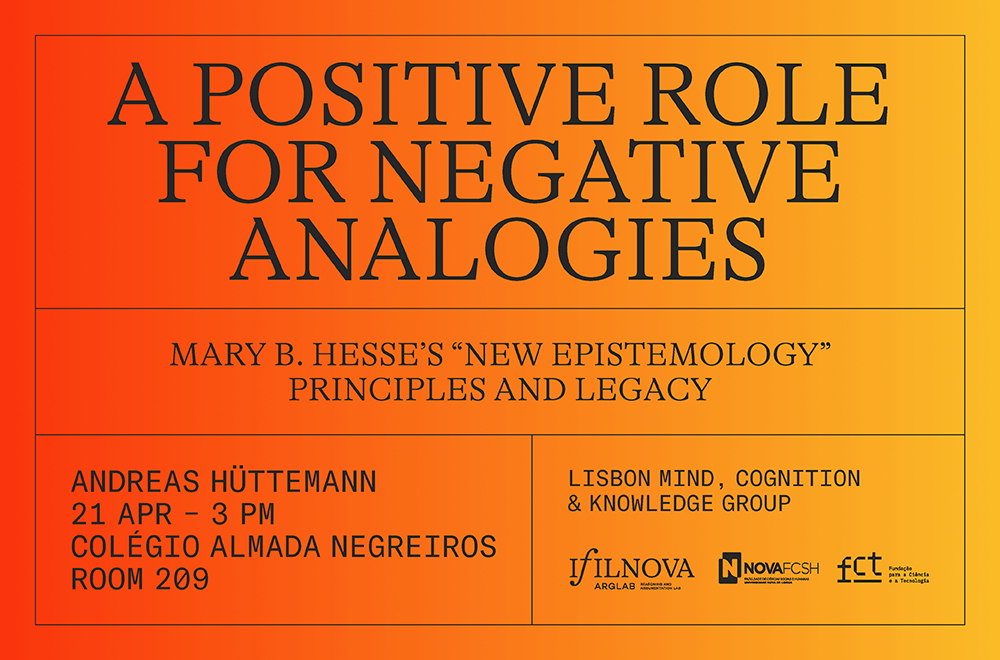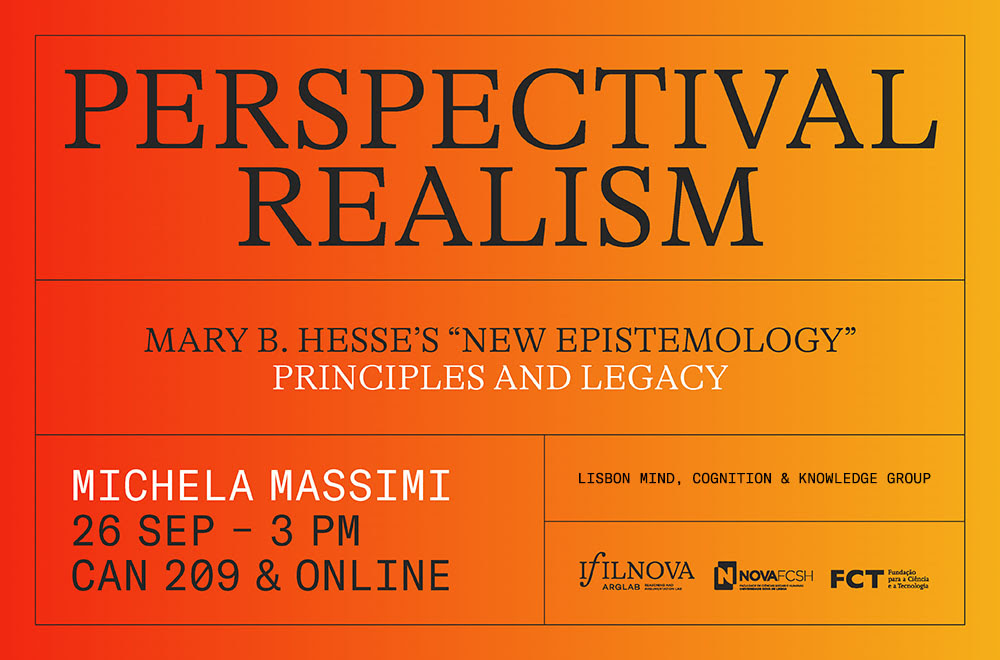Categories
Tag: Scientific Realism
Categories
Hesse on Materiality and Induction
The next session of our research seminar will be in charge of Francesco Nappo, from the Politecnico of Milan.
On October 24th, starting at 11:00, he will deliver a paper titled “Mary Hesse on Materiality and Induction“. Aim of this paper is to discuss one of the most widespread misinterpretations of Hesse’s works, which concerns the distinction between “formal” and “material” analogies in science, provide an interpretation of Hesse’s material condition that does justice to its epistemological significance, and bring out connections to some of Hesse’s other works on the topic of induction and scientific reasoning.
The session will take place at Colégio Almada Negreiros of the NOVA University of Lisbon , Room SE1.
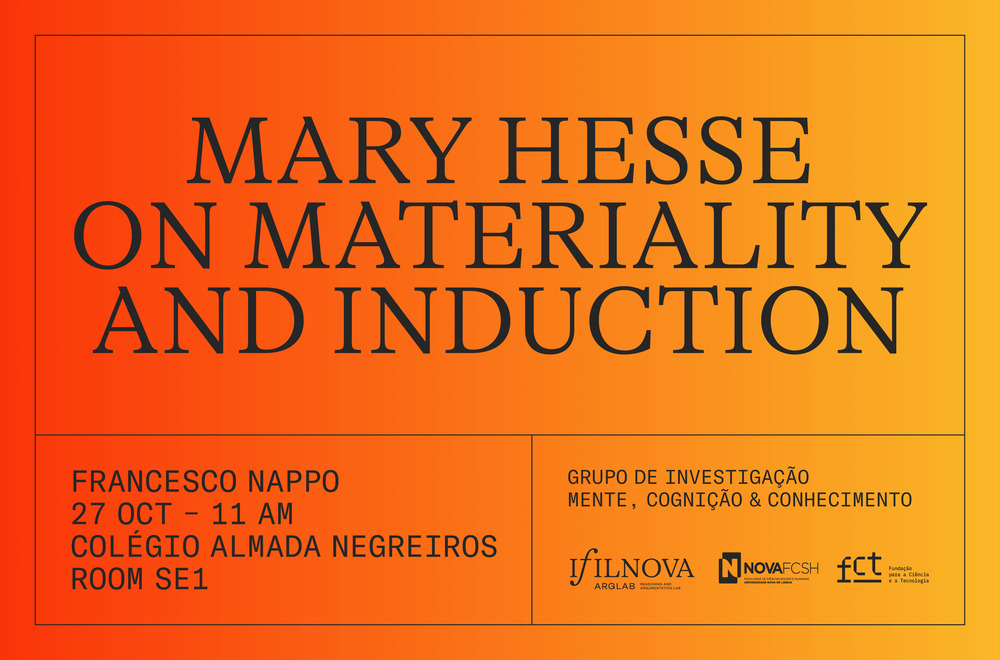
Categories
SciRep 2023
The programme of the conference “The Value of Scientific Representation. Classic Issues and Contemporary Challenges”, is out!
Take a look at it at this link.
The conference takes place at the NOVA University of Lisbon on June 21st-22nd, 2023.
Keynote Speakers: Alisa Bokulich (Boston University) and Michela Massimi (The University of Edinburgh).
Organized within the activities of the research project “Mary B. Hesse’s ‘new epistemology’. Principles and Legacy” (FCT/IFILNOVA), The conference aims to explore issues from the current debate on scientific representation that may be – directly or indirectly – connected with Mary B. Hesse’s theoretical understanding of science. On a general level, the speakers will engage with open questions related with the value of the scientific world-explanation from a variety of viewpoints that shall not be limited to a philosophical or linguistic analysis of the issues explored, but may also involve contributions devoted to classic figures of the history and philosophy of science.
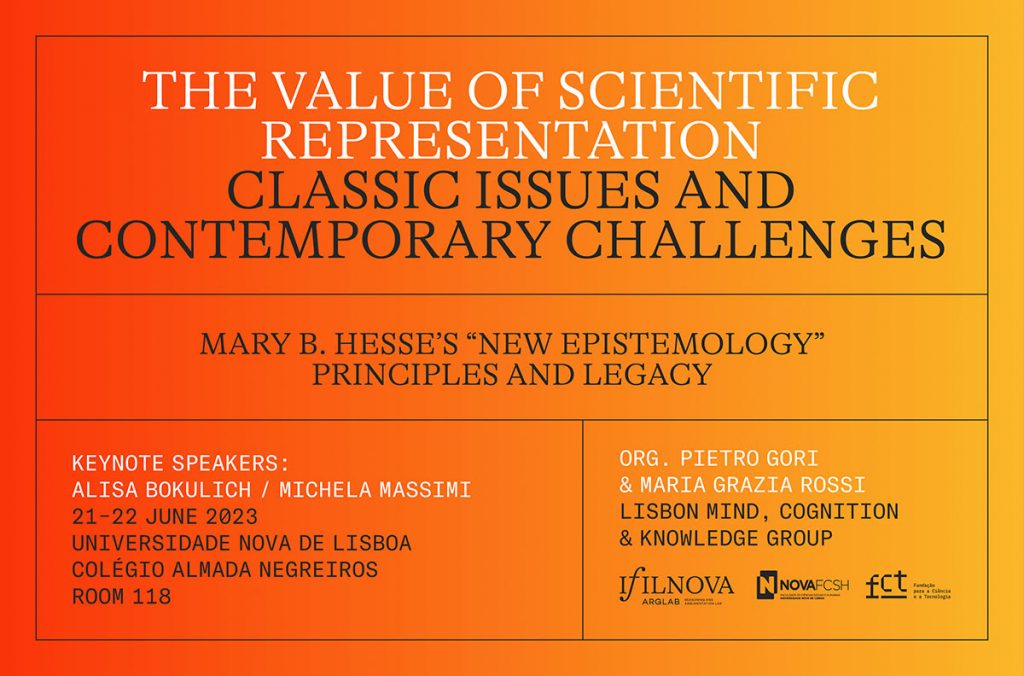
Categories
Negative Analogies
The next session of our research seminar will be in charge of Andreas Hüttemann, from the University of Cologne.
On April 21st, starting at 15:00, he will deliver a paper titled “A Positive Role for Negative Analogies”, a term introduced by Mary Hesse in her work on models and analogies. “Negative analogies” stands for properties of the model that the target system lacks. In his talk, Andreas Hüttemann will explore, first, why according to Hesse we need to use models in science, second, what Hesse has to say about the role of negative analogies in particular. He will then argue that the role of negative analogies is best understood in the context of a more general account of idealization. Negative analogies, conceived of as idealizations, provide us with knowledge of invariance relations, or more generally with modal knowledge.
The session will take place at Colégio Almada Negreiros of the NOVA University of Lisbon , Room 209.
Categories
Ernst Mach and Perspectival Realism
A new article by Pietro Gori has been published in the Journal for General Philosophy of Science.
The paper titled “The Perspectival Realist features of Ernst Mach’s Critical Epistemology“ has a twofold aim. On the one hand, it explores the extent to which Mach was inspired by Kant’s approach to philosophical inquiry and tried to further elaborate it through his historico-critical method for enlightening scientific knowledge claims. On the other hand, it argues that the focus on the situated character of these claims that is implied in Mach’s epistemology makes it possible to compare his view to recent attempts to defend a perspectival realist account of scientific knowledge, thus revealing the relevance of Mach’s own approach as a methodology in the philosophy of science.
Full-text access to a view-only version of the paper is available here, as part of the Springer Nature Content Sharing Initiative.
Categories
CFP – 2023 Conference in Lisbon
We invite you to submit papers for the conference “The Value of Scientific Representation. Classic Issues and Contemporary Challenges”, that will take place at the NOVA University of Lisbon on June 21st-22nd, 2023.
Keynote Speakers: Alisa Bokulich (Boston University) and Michela Massimi (The University of Edinburgh).
Organized within the activities of the research project “Mary B. Hesse’s ‘new epistemology’. Principles and Legacy” (FCT/IFILNOVA), the conference aims to explore issues from the current debate on scientific representation that may be – directly or indirectly – connected with Hesse’s theoretical understanding of science. On a general level, we would like the speakers to engage with open questions related with the value of the scientific world-explanation from a variety of viewpoints that should not be limited to a philosophical or linguistic analysis of the issues explored, but may also involve contributions devoted to classic figures of the history and philosophy of science.
Possible topics may include:
– The epistemic function and value of scientific modelling;
– Varieties of figurative representations in science (metaphors, analogies, fictions, perspectives, frames, etc.);
– Scientific realism vs. relativism and instrumentalism;
– Analytic vs. historic philosophy of science;
– Coherence vs. correspondence theories of truth;
– Hermeneutic understanding of the natural sciences;
– Classic engagements with scientific representation;
– History, development and discussion of positivist and/or empiricist epistemology;
– Contribution to the philosophy of science of leading figures of the so-called “post-empiricist” turn (Quine, Kuhn, Feyerabend, etc.);
Reference to Hesse’s work and preferred issues will be very much appreciated, although it is not required.
Deadline for Submission: March 14th, 2023
Notification of Acceptance: March 30th, 2023
Abstracts in English and not exceeding 300 words can be sent to Pietro Gori at the following address: scirep2023@gmail.com
Categories
Forces and Fields
On November 21, 2022, María De Paz will give a talk on one of the first works published by Mary Hesse, “Forces and Fields” (1961).
In that book, Hesse focuses on the question “How do bodies act on one another across space?”, elaborating a variety of answers that illustrates the function of fundamental analogies or models in physics, as well as the role of so-called unobservable entities. Hesse examines the use of analogies in primitive scientific explanation, particularly in the works of aristotle, and contrast them with latter-day theories such as those of gravitation and relativity. Her perspective sheds considerable light on the scientific thinking of antiquity, and it highlights the debt that the seventeenth-century natural philosophers owed to Greek ideas.
The session will take place at Colégio Almada Negreiros of the NOVA University of Lisbon , Room SE1, from 2:30 PM.
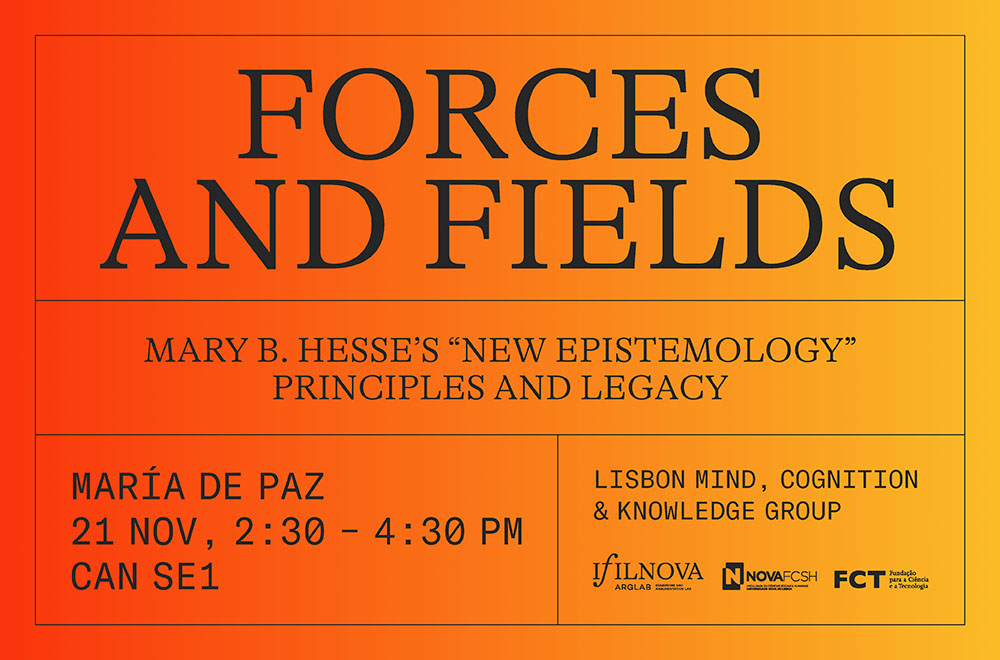
Categories
Scientific Modelling Workshop
On November 4, 2022, our research project will host a workshop on “Scientific Modelling and the Classic Tradition”, with guests from the Inductive Metaphysics research group.
The meeting will take place at the NOVA University of Lisbon, FCSH (av. de Berna 26 C).
Programme
10AM-12AM – Session 1
FCSH Building B, Room 304
– Kristina Engelhard (Uni Trier), “Modeling natural kinds according to Kant”
– Lorenzo Spagnesi (Uni Trier), “Regulative Idealization: A Kantian Approach to Idealized Models”
2PM-4PM – Session 2
FCSH Building B, Room 304
– David Hommen (Uni Duesseldorf), “A Wittgensteinian View of Models”
– Giulia Terzian (IFILNOVA), “False models can be good models: the case of generative linguistics”
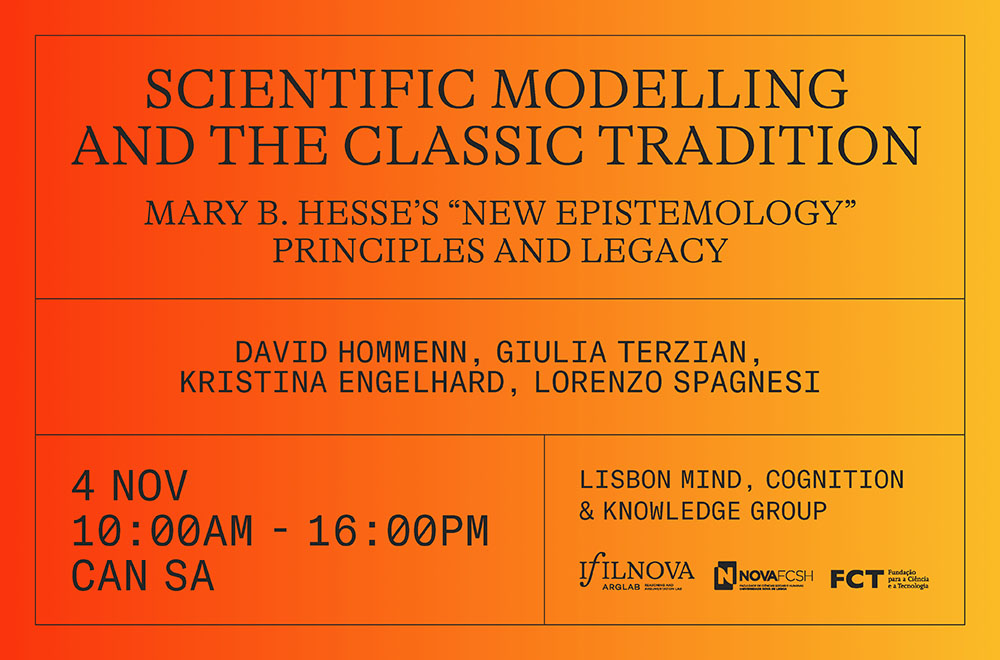
Categories
Book launch
As previously announced, on September 26, 3-5 PM (London/Lisbon time), we will host a session with Michela Massimi, who will present her newly published book on Perspectival Realism.
Anyone who is based in Lisbon can join the session at Colégio Almada Negreiros / Universidade NOVA de Lisboa, Room 209.
For those who are not in Lisbon and would like to attend online, free registration is required through this form. The link to the Zoom session will be sent the day before the event.
Categories
